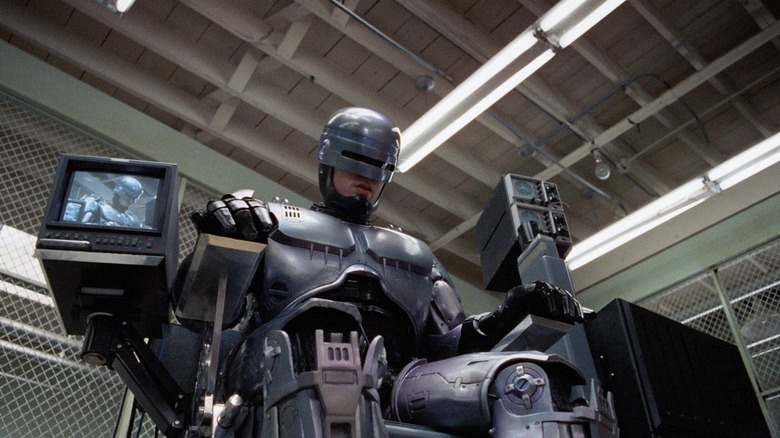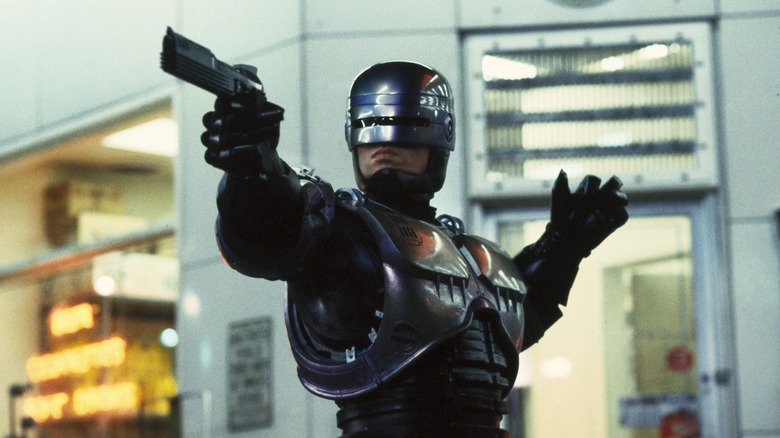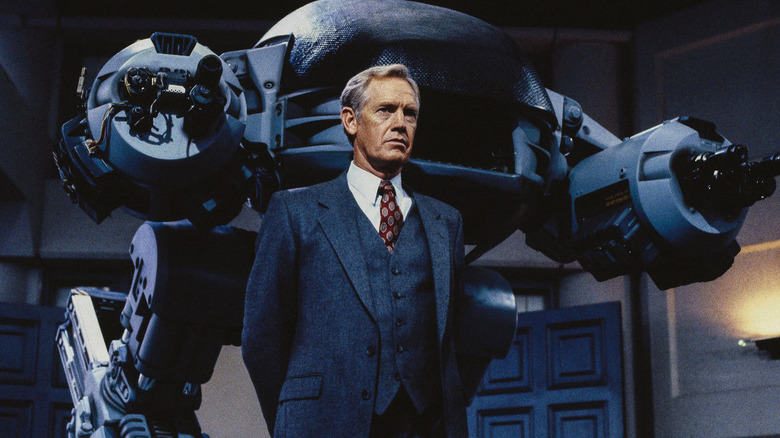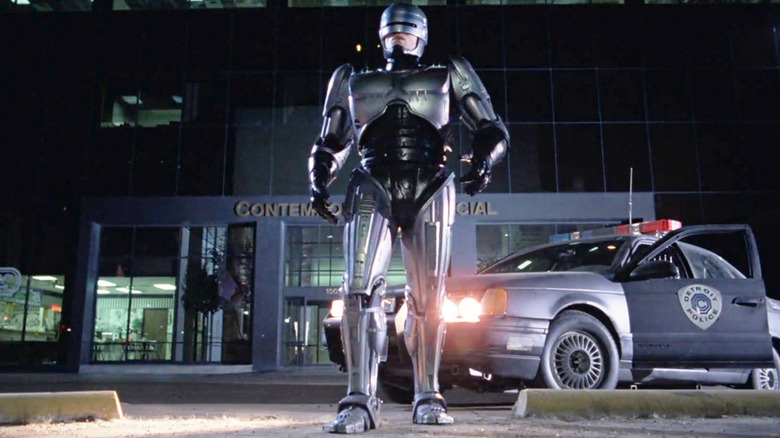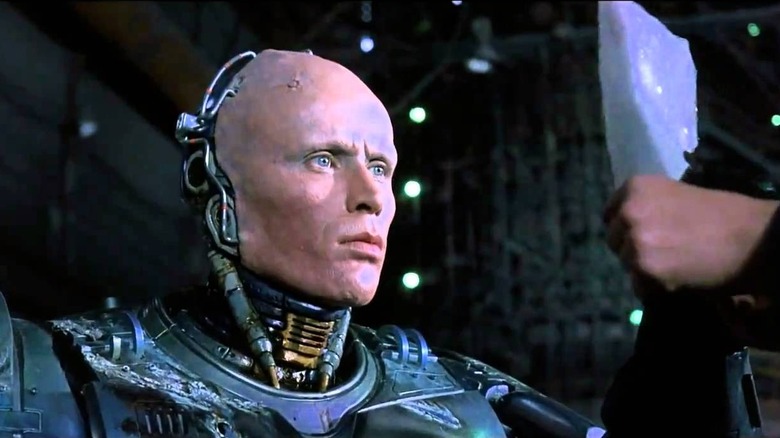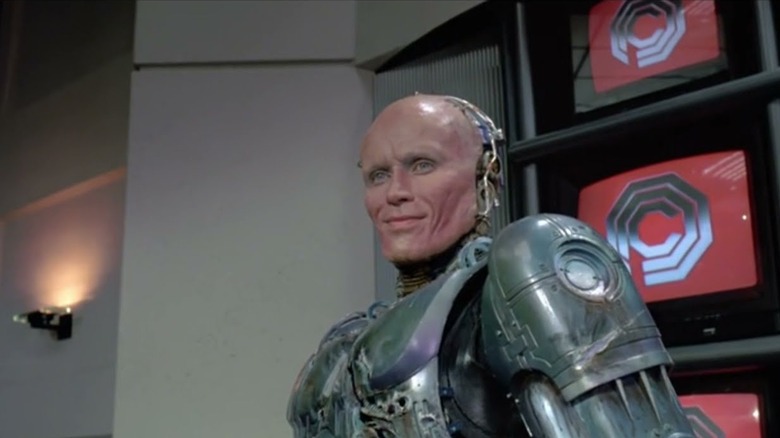RoboCop (1987) Ending Explained: A Working-Class Underdog
"RoboCop" was a hot favorite on the school playground when I was a kid. Stories of brutal cop killings and boardroom bloodbaths joined the head-popping scene from "Scanners" and the gruesome exploits of Freddy Krueger as the kind of viewing choice that separated the cool kids from the rest of us. Or at least, separated those who had access to their parents' video rental card from those who didn't.
I caught up with it again several years ago after a gap of about two decades, going in expecting a blast of pure '80s nostalgia. I got a blast alright, but there was nothing sentimental about it. Seeing it again as an adult made me realize that "RoboCop" isn't just a fun movie, it's a great one. Paul Verhoeven directs the hell out of it and there is plenty of substance and style to go with the over-the-top action.
Like all the best sci-fi dystopias, the prophetic satirical elements that largely went over my head as a kid have only become more relevant with age. It's ridiculous how much is packed in there, wickedly taking on corporate greed, rampant consumerism, cynical gentrification, and the privatization and militarization of the police, all while telling a genuinely moving story that touches upon themes of humanity and the soul.
"RoboCop" is Paul Verhoeven's masterpiece. In the hands of a lesser artist, a splattery action movie with so much on its mind might have seemed overstuffed, but the Dutch director never misses a beat and brings all the threads neatly together for a glorious fist-pump of a finale. What's not to love?
So what happens in RoboCop again?
"RoboCop" is set in a dystopian near-future where Detroit is in the grip of vicious criminals like Clarence Boddicker (Kurtwood Smith) and his gang of cackling hoodlums. The embattled police force has recently been taken over by the appropriately sinister Omni Consumer Products (OCP), putting it in the dubious hands of corporate players looking to make a fortune with their latest line in mechanized law enforcers.
The company's villainous Senior President Dick Jones (Ronny Cox) seeks approval from his boss "The Old Man" (Daniel O'Herlihy) to roll out his ED-209 unit, a fearsome walking gunship that is still a little glitchy. When Jones's baby goes wildly on the fritz during a boardroom presentation, his ruthless coke-fuelled rival Bob Morton (Miguel Ferrer) jumps at the chance to push his alternative RoboCop program that will ostensibly give cyborg law enforcement a more human face. All he needs is a "sucker" to donate that face.
Enter Alex Murphy (Peter Weller), a serene police officer and family man who transfers to the blue-collar Detroit West police department. He partners up with butt-kicking Anne Lewis (Nancy Allen), and their first call puts them on the trail of Boddicker and his goons. Pursuing them to an abandoned factory without backup, Murphy is brutally murdered.
Morton now has his test subject and Murphy is resurrected as RoboCop, a gleaming robotic police officer ready to hit the streets and become the public's hero. He quickly blazes a trail through the city's lowlifes but there is a snag: Although he has supposedly had his brain wiped, ghosts of his former life emerge and he goes off-script, gunning for Boddicker's gang. This is bad news for Dick Jones, who is secretly supporting Boddicker to ramp up the fear factor in the city in preparation for his master plan.
Corporate greed and the police in RoboCop
If the worst excesses of capitalism and Reagan-era "greed is good" economics are the broad target of the satire in "RoboCop," OCP and their ruthless takeover of Detroit's police force is the most crucial aspect to the story.
When it comes to how Omni Consumer Products like to do business, the clue is in the name. With their fingers already in numerous formerly non-profit pies like healthcare and the military, the corporation is omnipresent. Dick Jones's big plan is to take over Detroit's crime-ridden inner city and build New Detroit, a gleaming monument to soulless gentrification. In order to do this, he pays Boddicker and his gang to kill cops, spread fear, and drive people out of the area.
Then there is the potentially lucrative roll-out of his ED-209 unit, which Jones hopes will become the "hot military product of the next decade" if a trial run on the streets of Detroit proves a success. The gory disaster in the boardroom demonstration isn't a good omen, but who cares if it doesn't work properly? Jones also has the contracts for spare parts sewn up as well.
Bob Morton's RoboCop initiative is a hit with the public but no less cynical. Now working for OCP, police officers must sign waivers that pass ownership of their bodies to the company in the event of their deaths. Presumably, Morton expects to produce more than one RoboCop unit, which means he would potentially have a whole squad of undead cops with cyborg enhancements on the streets if he got the chance. Perhaps this is what Murphy anticipates later in the film when Lewis is badly injured and he says; "Don't worry, they'll fix you. They fix everything." Thankfully Lewis recovers from her wounds and is still very much human in "RoboCop 2."
RoboCop as an American Jesus
Paul Verhoeven has said that he considers RoboCop an "American Jesus," and there are certainly parallels to Christ in the movie. Alex Murphy arrives in the urban war zone as a slightly aloof, saintly character, emphasized by Peter Weller's performance. In the era of muscle-bound '80s action stars like Sylvester Stallone, Arnold Schwarzenegger, and Chuck Norris, he brings a far more ethereal quality to his role.
Murphy's execution by the gang is his crucifixion, a good cop who dies for our sins: Namely, the rampant capitalism that has allowed Detroit to degenerate into such a violent, scum-ridden, drug-plagued hellhole. Verhoeven doesn't push the symbolism too far in the scene, but it is almost as brutal as the beating Jesus takes in "The Passion of the Christ." Notably, the first shot pierces his palm ... well, blows his hand off entirely, but the message is clear.
After he is pronounced dead, Murphy is resurrected as RoboCop, the savior of Detroit. Later, Verhoeven even shoots him as if he's walking on water. The metaphor is there, but I'm not sure it adds up to all that much. RoboCop is more of an amalgam of many hero archetypes, including Jesus. His party trick of twirling his gun on his finger before holstering it is a direct callback to the Western heroes of the past, which has its futuristic equivalent in his son's favorite show, "TJ Laser." Going even further back, RoboCop literally looks like a knight in shining armor. Always shot from below for ultra-hero angles, his suit gleams brightly in the headlights of his patrol car when he rescues a damsel in distress from two scumbags trying to sexually assault her.
How human is Murphy?
The thing that keeps me coming back to "RoboCop" is Murphy's gradual rediscovery of his identity and his humanity. It is handled beautifully, and the pathos goes hand-in-hand with the violence to make the conclusion pay off with such a glorious note.
Despite the brain-wipe, Murphy starts having flashbacks which lead him to investigate who he was previously. One of my favorite scenes is when he revisits his old house and visions of his wife and son vanish as he walks from room to room. It's a heartbreaking moment: No matter how much he finds out about his former self, the old Alex Murphy is dead and gone. Now he is just a soul trapped in the RoboCop chassis.
If the soul is the essence of our humanity, does that make Murphy still human, even though he is now mostly a cyborg? His brain may have been wiped, but he is still capable of emotions and feeling love and sadness for the family he has lost. The things that made him human aren't quite as easily erased as his memories.
It's not made clear how much of Murphy's old body remains. Bob Morton's callous instruction to lose the arm that the doctors managed to save suggests that most of it was a total write-off. He does get to keep his eyes, however, which is an important factor in Murphy's recovery of his humanity. If the eyes are the windows to the soul, then Murphy's are covered by RoboCop's black visor for a good portion of the film. When we finally see them again, they are filled with infinite sadness as he realizes what he has become and that he can never go back. One thing he can do, however, is get even.
The ending
After Murphy and Lewis have taken out Boddicker's gang at the mill, it's time to settle the score with Dick Jones. Previously, we saw that RoboCop was unable to arrest Jones due to the shadowy Directive 4, a classified failsafe that prevents him from acting against OCP Executives. A kind of Asimov's Law for corporate scumbags, if you will.
Crashing into a board meeting, Murphy uses his data spike to reveal Jones's true intentions to the other board members. It's a neat touch; he used the spike to kill Boddicker, and now he's using it to kill Jones's career.
Jones gets desperate and takes his boss hostage at gunpoint, but Chief Executive isn't as doddery as it seems. He thinks quickly and fires Jones on the spot. No longer an employee of OCP, directive 4 is overridden, allowing Murphy to blow him away. The Old Man praises his shooting and asks his name. "Murphy," he responds, with a huge smile.
This ending plays out so triumphantly for two reasons. Firstly, Murphy goes through an incredible ordeal to get here. He is shot, killed, revived, turned into a robot, betrayed, shot again by about a hundred cops, battered, crushed under a pile of steel, and skewered through the chest. It's one hell of a journey, and it would take a stony heart not to feel overjoyed for him when he finally reclaims his identity as Murphy.
Secondly, it is a victory for a regular guy like Murphy over grasping millionaires like Dick Jones and his corporate buddies — something that plays even better in the current climate than it did back in the '80s. No wonder there are plans to erect a RoboCop statue in Detroit; he's a true underdog and working-class hero for the city in the way Rocky Balboa is for Philadelphia.
